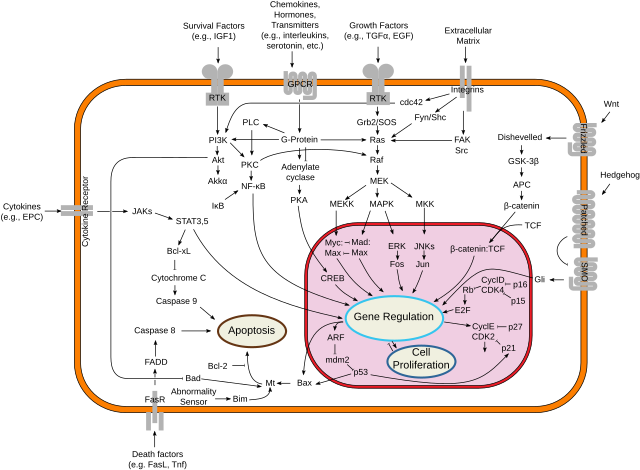Signal transduction
cellular process in which a signal is conveyed to trigger a change in the activity or state of a cell From Wikipedia, the free encyclopedia
A signal transduction in biology is a cellular mechanism. It converts a stimulus into a response in the cell.[1] There are two stages in this process:
- A signalling molecule attaches to a receptor protein on the cell membrane.
- A second messenger transmits the signal into the cell, and a change takes place in the cell.


So, signal transduction starts with a signal to a cell receptor, and ends with a change in cell function. In either step, the signal can be amplified. Thus, one signalling molecule can cause many responses.[1]
Receptors are in the cell membrane, with part of the receptor outside and part inside the cell. The chemical signal binds to the outer portion of the receptor, changing its shape. This causes another signal inside the cell. Some chemical messengers, such as testosterone, can pass through the cell membrane, and bind directly to receptors in the cytoplasm or nucleus.
Sometimes there is a cascade of signals within the cell. With each step of the cascade, the signal can be amplified, so a small signal can result in a large response.[1] Eventually, the signal creates a change in the cell, either in the expression of the DNA in the nucleus or in the activity of enzymes in the cytoplasm.
Most often, ordered sequences of biochemical reactions inside the cell are involved. These are carried out by enzymes and linked through second messengers. So a "second messenger pathway" is produced. These things usually happen quickly, sometimes very quickly. They may last from milliseconds (in the case of ion flux) to days for gene expression.
The number of proteins and other molecules that take part increases during the process. So a 'signal cascade' develops and a relatively small stimulus may cause a large response.
In bacteria and other single-cell organisms, the transduction processes a cell has limits the number of ways it can respond to its environment. In multicellular organisms, lots of different signal transduction processes are used to coordinate the behavior of individual cells. By this means the function of the organism as a whole is organized. The more complex the organism, the more complex the repertoire of signal transduction processes the organism must possess.
Thus, sensing of both the external and internal environment at the cellular level, relies on signal transduction. Many disease processes such as diabetes, heart disease, autoimmunity and cancer arise from defects in signal transduction pathways. This highlights the critical importance of signal transduction to biology and medicine.[2]
These systems of communication between cells are extremely ancient, and are found in all metazoa.[3]
Related pages
References
Other websites
Wikiwand - on
Seamless Wikipedia browsing. On steroids.
